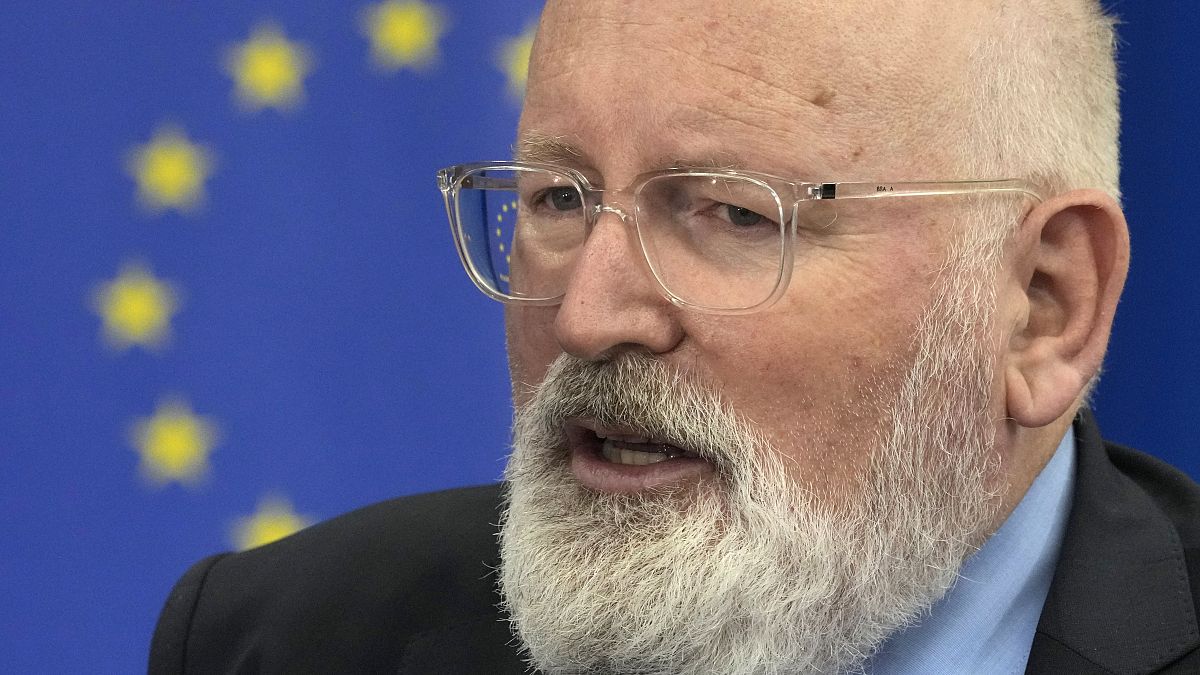The war in Ukraine will lead to higher energy bills for Europeans, but they must resist to ensure democracy prevails, the EU Commission's Frans Timmermans tells Euronews
Russia's invasion of Ukraine will lead to higher energy prices for Europeans but the cost of surrendering to Moscow's attack against democracy will be even higher, Frans Timmermans, European Commission's Executive Vice-President, told Euronews.
"Because of the crisis, because of what's happening, because of the manipulation also by the Russians of the market, we will have higher energy prices, but we need to make sure we invest so much in renewable energy that we can tell our citizens that soon the energy bills will go down," Timmermans, the man in charge of the European Green Deal, said.
"We cannot just reduce the cost to the cost of our energy. We should see the broader picture: the cost to our democracy, to our society, to our liberty would be huge if we do not confront Putin right now. And that means that we have to take into account the risk of higher energy prices in the short term."
"If you look at those countries in Central and Eastern Europe who depend highly on Russian gas, they are willing to pay the price because they know they have paid the price before, being under Moscow's control, and they certainly don't want to return to that situation. So we should be listening to their advice," he added.
For Timmermans, the green transition represents a unique opportunity for EU to wean itself off fossil fuels and strengthen the bloc's independence so "we don't need to send billions to Russia to keep our houses warm."
Even if renewables have already overtaken fossil fuels as Europe's main electricity source, energy self-reliance is still decades away and price volatility is poised to become the new normal.
Since early autumn, the bloc has been under a persisting power crunch that has sent consumer bills to record highs. The crisis, which has fuelled popular discontent, is set to be further exacerbated by the war in Ukraine, given that Russia is the EU's main gas provider.
But Europeans must resist the economic burden because giving in to Vladimir Putin's aggression will entail a higher price: the defeat of liberal democracy, Timmermans warned.
"We can never again be at the mercy of this man and this regime when it comes to our energy supplies and this can be done relatively quickly. It's going to be painful," he said.
But Putin "will not stop at Ukraine if we don't stop him. He will try to impose his vision of the world, on all of us."
The Vice-President shared his words of admiration for the courage and determination displayed by Ukrainians during the war, but he admitted that "at this stage, [they] are very much left to their own efforts" and that a NATO intervention to stop the violence was "impossible."
'If we don't stand up, Putin will win'
Timmermans spoke to Euronews while EU foreign affairs ministers were meeting in Brussels to put the finishing touches to the latest raft of sanctions that EU leaders discussed in an in-person summit on Thursday evening.
The new package targets Russia's financial, energy and transport sectors, tightens exports control, including semiconductors, and restricts visa issuance. Put together, the EU aims to cripple at least 70% of Russia's banking system in order to cut off the necessary funds that bankroll the ongoing invasion of Ukraine.
The measures were announced as "unprecedented" and "massive" but shortly after they were decided, doubts arose about their shortcomings and effectiveness.
"When you impose sanctions and these are very far-reaching sanctions, you don't see an immediate effect," the Vice-President conceded. "You couldn't expect that from sanctions."
Russia's expulsion from SWIFT, the international system used to pay for energy transactions, was excluded, although it remains as an option on the table. The radical move would virtually stop any sort of trade between the EU and Russia, which in 2020 was worth €174.3 billion.
"It is a possibility some member states didn't think it would be wise to do it at this stage, but it's still distinctly on the table," Timmermans said, seemingly backing the idea.
"We should be very clear that we will not refrain from the harshest sanctions given what's happened. There's a war on in Europe. Can you imagine even pronouncing those words?"
Throughout the interview, Timmermans denounced Putin for violating Ukraine's sovereignty, financing European far-right parties and undermining Western democracy.
"Europe in the last 30 years has never been able to come up with a coherent and comprehensive strategy towards Russia, and the Russians have been playing around with that," he lamented.
"As long as we accept that disruption, as long as European prime ministers go to Moscow in the middle of a crisis to just make a gas deal for themselves, as long as that happens, the Russians will be laughing and we'll be trying to play off one European against the other," he added, in a veiled reference to the visit that Hungarian Prime Minister Viktor Orban paid to Vladimir Putin weeks before the invasion.
Timmermans said the only way to confront the Kremlin was to maintain Western unity and demonstrate the strengthen of democratic values.
"This is not just a war in Ukraine about Ukraine. This is an ideological confrontation between democracy and autocracy. We are confronted with someone [Putin] who is attacking our way of life, who's attacking our values. And if we don't stand up for them now, he will win," he said.
"I think the surprise in Moscow will be how united we are and that we are no longer willing to take that nonsense."
